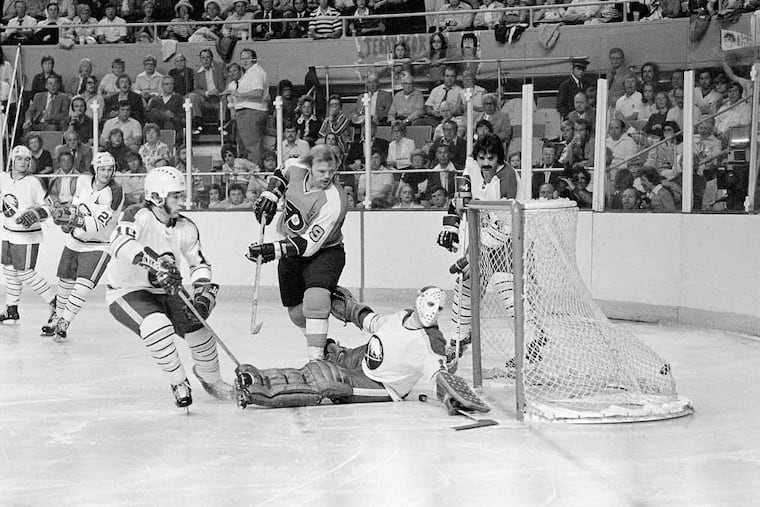Flyers playoff flashback: Bob ‘Hound’ Kelly gets to fill up his Corvette after his Cup-clinching goal
Bob Kelly, a bottom-six forward known for creating a spark, scored one of the most memorable goals in the Flyers' history in Game 6 of the 1975 Stanley Cup Finals. He broke a scoreless tie in the third period, triggering a Cup-clinching 2-0 victory in Buffalo.

Ninth in a series counting down the 10 most memorable playoff wins in the Flyers’ history. Today: No. 2.
In a scoreless 1975 playoff game in which the Flyers had a chance to win their second straight Stanley Cup, assistant Mike Nykoluk went to head coach Fred Shero after the second period and said the team needed a spark.
“We might want to put Hound out here,” Nykoluk said. “He hasn’t played in a while. He might give you the energy.”
So at the start of the third period, Shero sent Bob Kelly, better known as “Hound,” onto the ice during Game 6 in Buffalo.
Kelly was a bottom-six player who created havoc with his relentless checking ability and his fearless play, but he now found himself on the top line, alongside Bobby Clarke and Reggie Leach.
“It had been a back and forth game and no one was really getting an edge on anybody,” Kelly, 69, said in a recent interview. “I was well-rested, that’s for sure.”
On the initial third-period shift, Leach dumped the puck into the Buffalo zone. Kelly chased it behind the net and took a nasty check from Jerry Korab, a 6-foot-3, 220-pound Sabres defenseman. Clarke cleverly shielded Korab off the play, enabling Kelly to pick up the loose puck and spin out front, where he beat goalie Roger Crozier with a backhander 11 seconds into the period.
“The puck was laying right there after Clarkie bumped Korab, and Korab forgot about the puck,” Kelly said. “I was at the right place at the right time, but it took so many other goals before we were able to get into that type of situation.”
Kelly, now an ambassador with the Flyers who makes appearances and speeches at local schools when they are not closed because of the pandemic, said he loves “the way the guys all tap their hands after they score these days. Back then, when I scored the [Game 6] goal, I skated right over to the bench and said, ‘Hey, Freddy, You owe me five bucks.’ We used to practice that play all the time, coming from behind the net. So it wasn’t something that just materialized. It’s something we practiced, and if it worked [in a game], Freddy gave you five bucks. Hey, five bucks used to fill up my Corvette in those days.”
Kelly, one of the Flyers’ best fighters and a player who always played with an edge, was known as the “Pete Rose of hockey” because of his all-out hustle on every shift. He finished with 154 goals in his underrated career – and, to this day, is the only player in Flyers history to score a Cup-clinching goal on the road.
“By Hound scoring the winning goal, it shows you that anybody can do it,” cracked Bernie Parent, the Hall of Fame goaltender who played brilliantly in that 2-0 Game 6 win in Buffalo. “Hound took a heck of a check behind the net and he stayed with the puck and beat Crozier, who was a heck of a goalie.”
With 2:47 left, Bill Clement made it 2-0 by putting a shot through Crozier’s legs on a breakaway after taking a slick feed from the double-teamed Orest Kindrachuk, who was checked into the boards after making the pass.
For Kelly and teammate Gary Dornhoefer, each of whom was injured and didn’t play in the historic Cup winner against Boston in 1974, this victory was extra special.
In the 1974 Cup-clinching win, and some other playoff games, Bruce Cowick replaced Kelly (knee), and Simon Nolet replaced Dornhoefer (shoulder).
“When you’re not in there bleeding with the guys and suffering with the guys and what they’re going through, it hurts,” Kelly said. “… It was just so much more fulfilling to go from start to finish for the whole season for the second Cup, and as a team, we proved the first one wasn’t a fluke.”
Dornhoefer agreed.
“When you’re not there and you win, you kind of feel left out and not a part of it,” Donrhoefer said. “You don’t get the same feeling as when you’re on the ice, like I did the next year in Buffalo. That was very gratifying.”
As for Kelly’s goal, Dornhoefer also referenced Shero’s drills.
“We did it just about every practice, having the puck behind the net and coming out front and trying to beat the goaltender,” Dornhoefer recalled in early May. “We practiced it over and over and over again."
The practice led to Kelly winning $5.
And the Flyers winning a Stanley Cup.